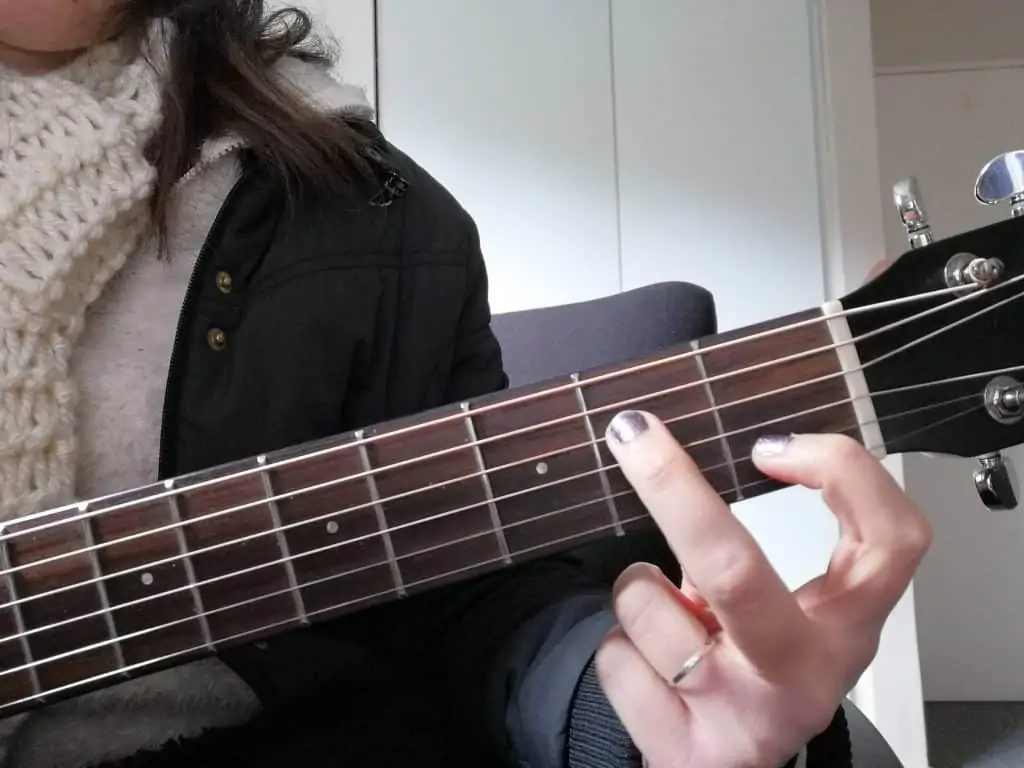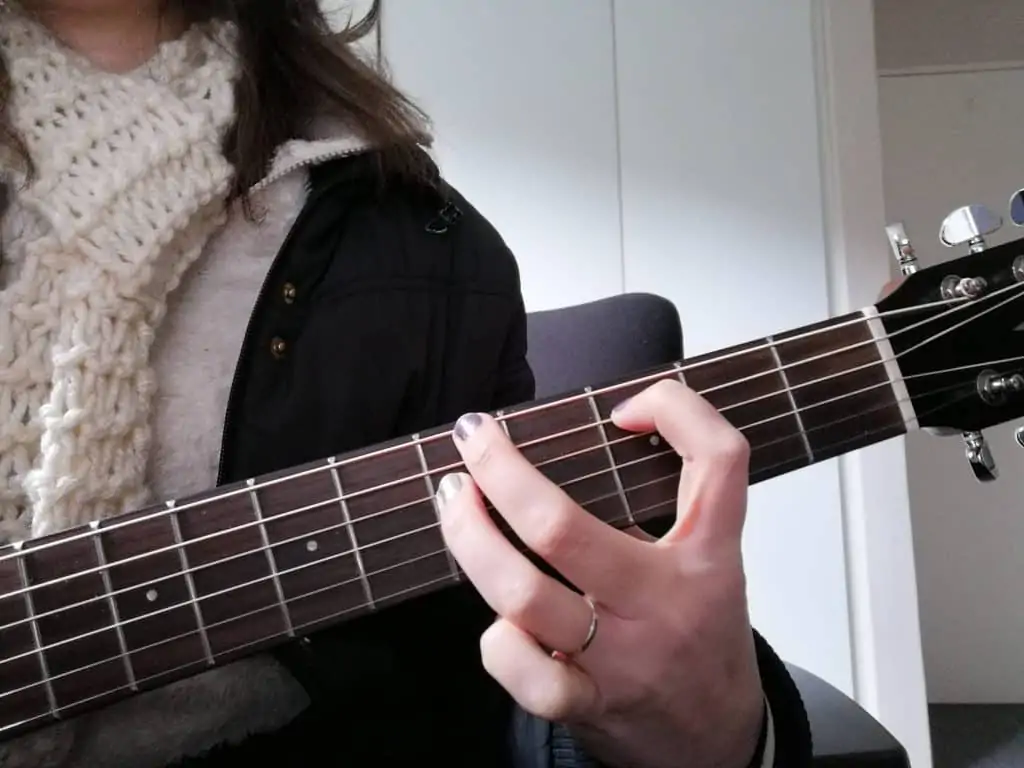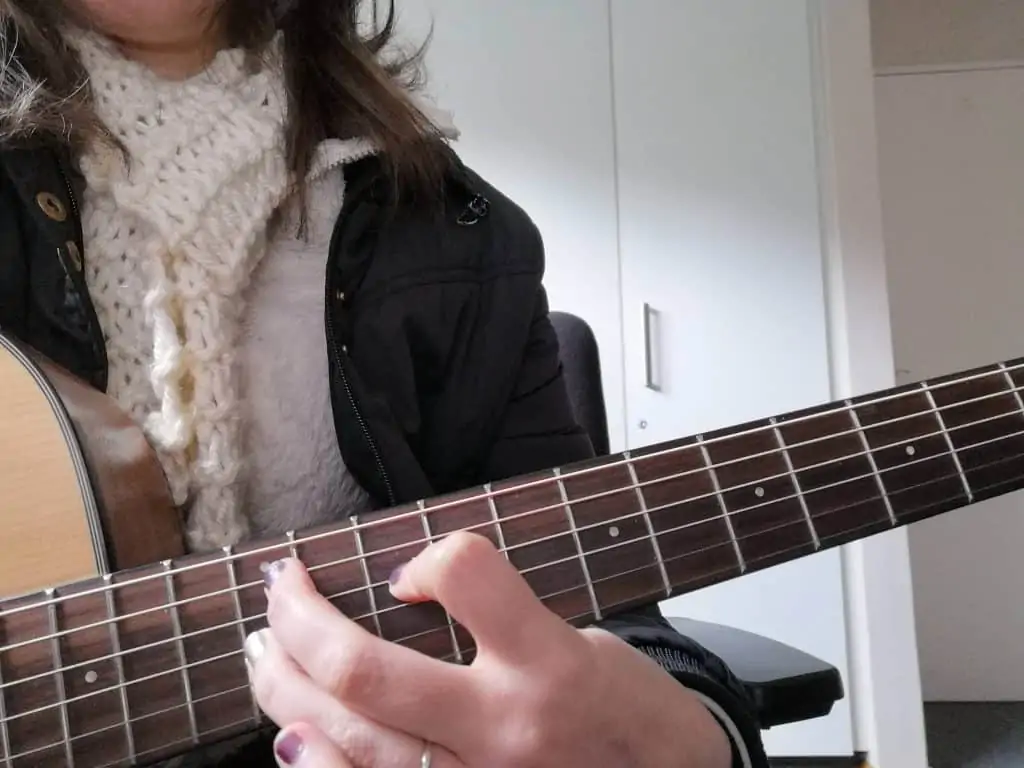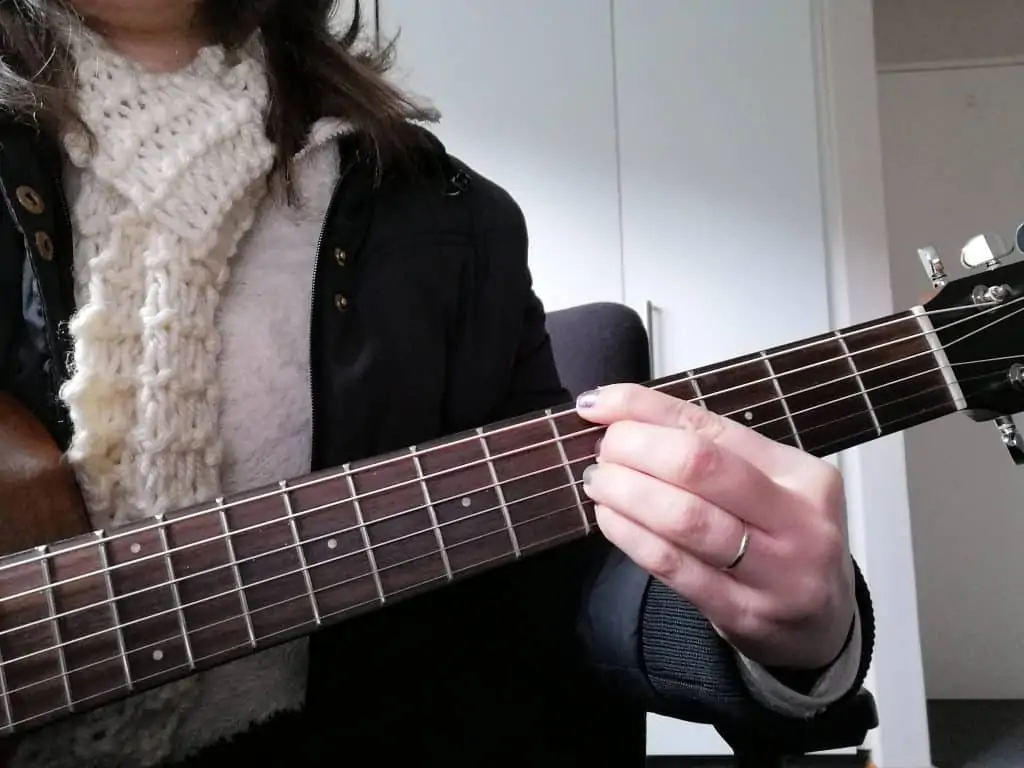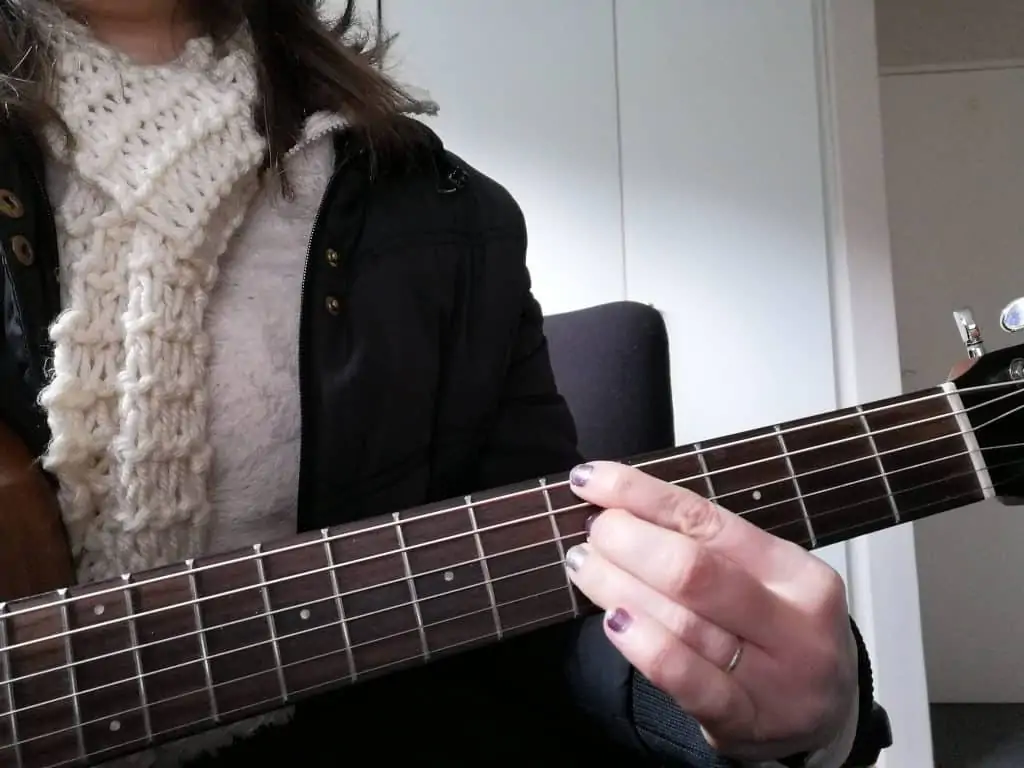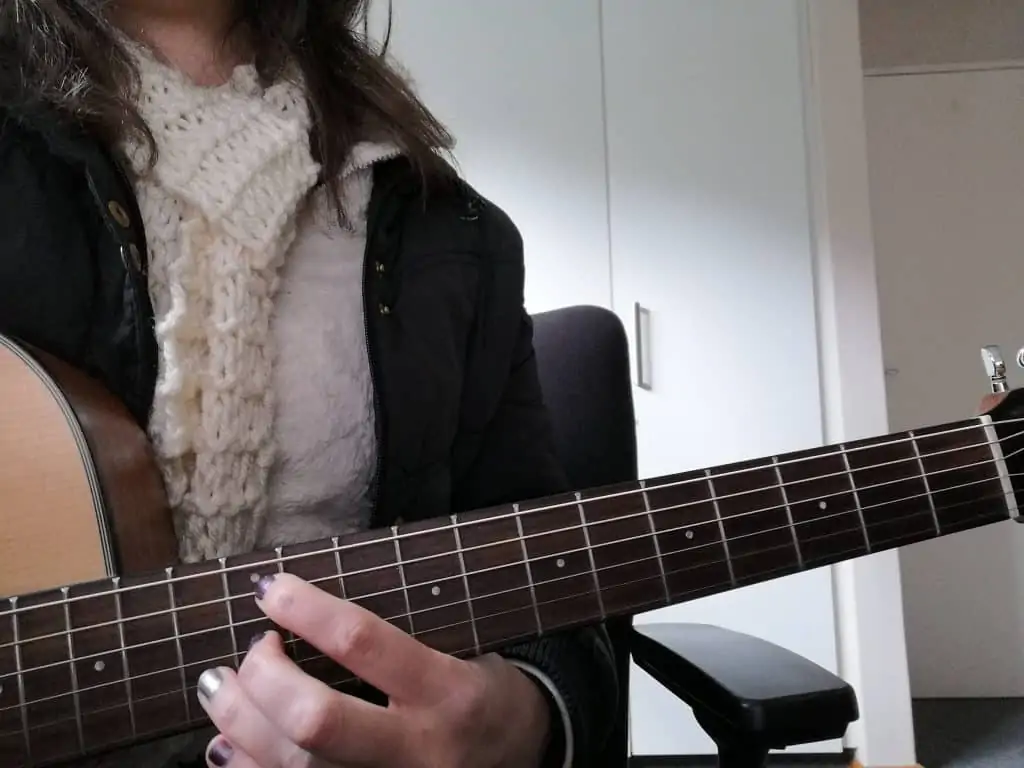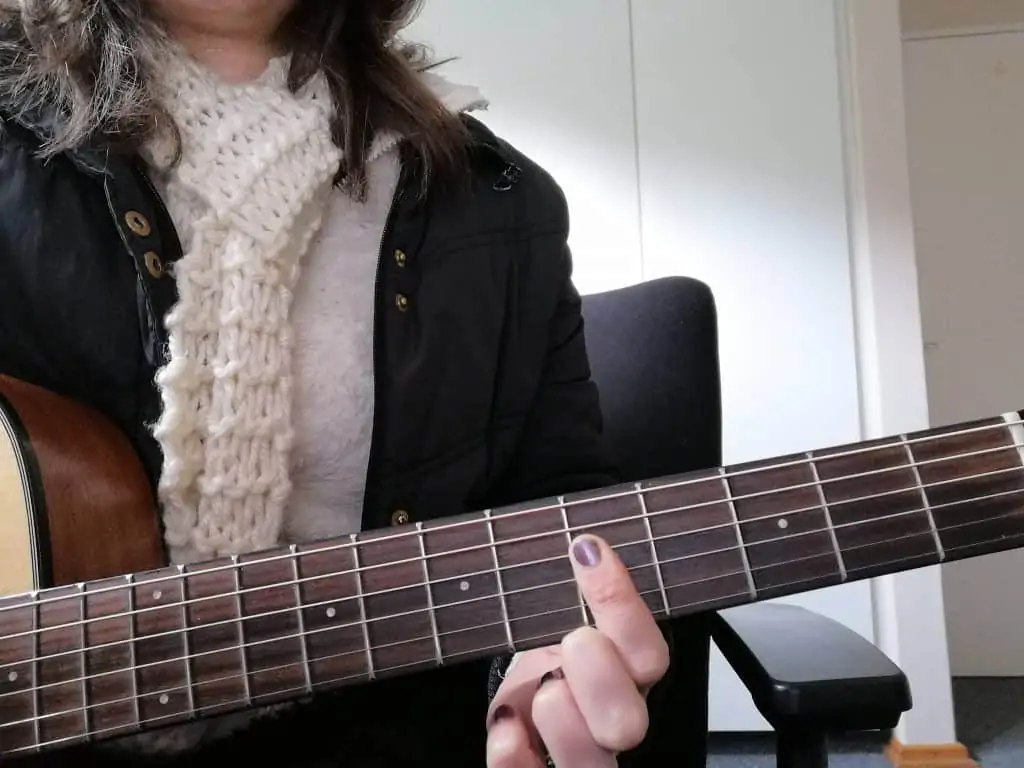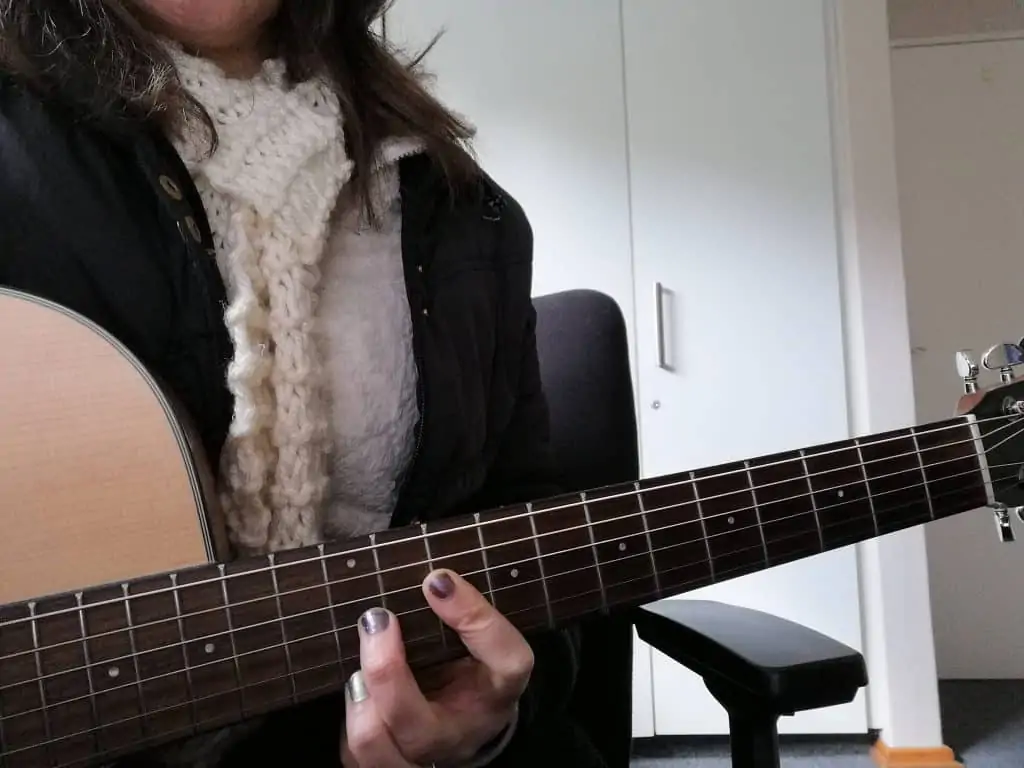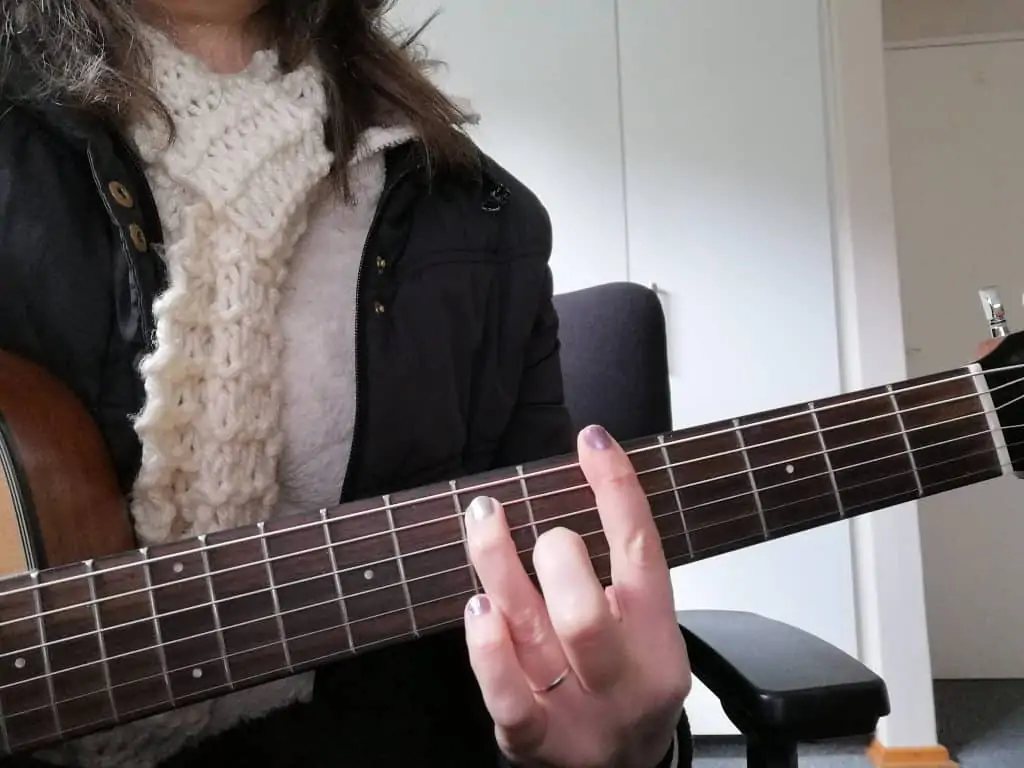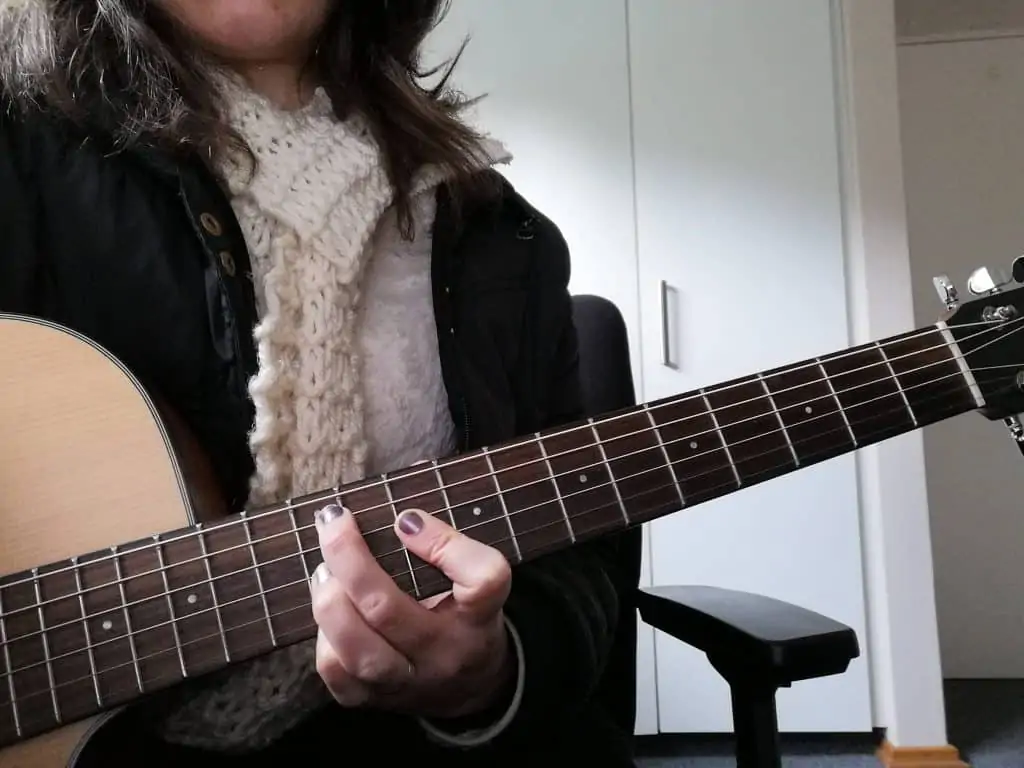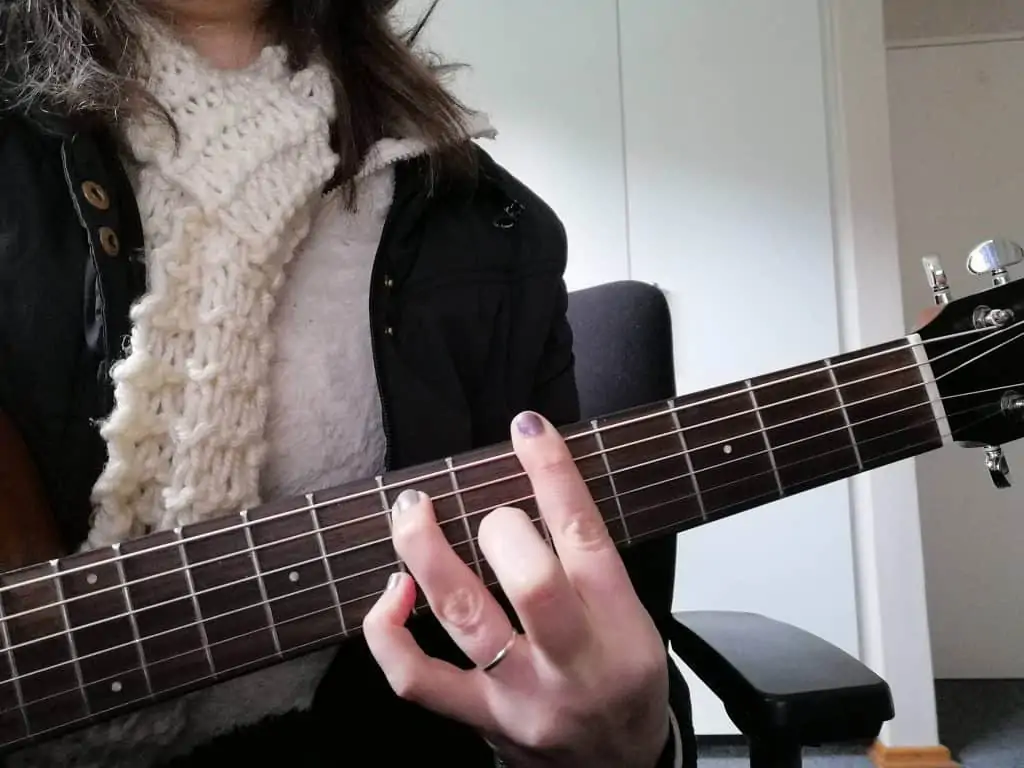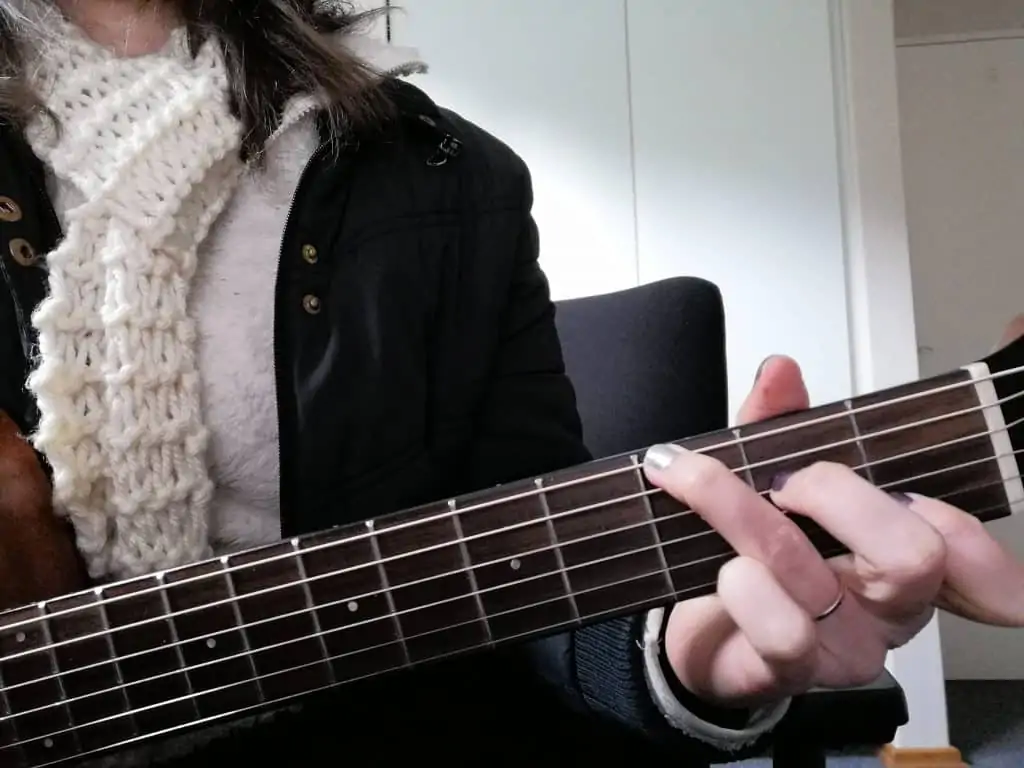As a beginner guitarist, I had this impression that any chord that had a number tacked onto the back of it was hard. To be fair, they can be. But many of them are actually quite easy to play, as is the case with Am7. The beauty about the guitar is that you can get the same note in a few different places on the neck.
The Am7 chord has several variations that you can choose from based on your skill level and/or the voicing you like best. Because the variations are in different frets, you may also just pick one played in a certain fret, so you don’t have to do some crazy moving up and down the neck of the guitar based on the other chords you’re playing.
The Theory of the Am7 Chord
Written out, the notes in the Am7 chord are A, C, E, G.
What makes a chord a minor chord, is a flattened third. To demonstrate what exactly a flattened third is, let’ look at the A major scale.
A, B, C#, D, E, F#, G#
1 2 3 4 5 6 7
A chord triad (3 notes) is built on the first, third and fifth interval.
A major would be A, C#, E. But since we want the minor chord, we flatten the third making it A, C, E.
To make it a seventh, we add on the seventh interval, which in A major is the G#. But since we want a minor seventh, that is also flattened to make a G.
You could also look at it from the perspective of the A minor scale. This is the natural A minor scale. I say natural minor because there are three different minor scales. The natural scale, however, is simple and works perfectly for what I’m showing you.
A, D, C, D, E, F, G
1 2 3 4 5 6 7
To make it a seventh, we add on the seventh interval, the G.
So when we play the chord on the guitar, the open strings and the fretted notes will be a combination of A, C, E, and G.
Here is a video that explains seventh chords (there are five types):
The Easy Am7 Guitar Chord
This is one of the simplest chords out there since you only need to use two fingers and in a position that comes naturally too.
This version does have a slight jazzy tone to it, but it fits in well with regular open chords and when you play pop or acoustic versions of rock songs too. It’s a great chord that goes well with most genres, actually, whether played on an electric or acoustic guitar.
I often replace Am with this chord, since it spices up run-of-the-mill chord progressions in a mellow way.
How to Play the Easy Am7:
Easy Am7
- Index finger: 2nd string, first fret
- Middle or Ring finger: 4th string, second fret
The Am7 Shell Chords
Shell chords use only three strings, the three fretted notes, and are generally used in jazz. Shell chords are moveable, meaning that you keep the shape and shift it up or down the neck to the root note.
How to Play the 1 3 7 Am7 Shell Chord Using the Root Note on the E-String (6th string):
The 1 3 7 refers to the intervals, A, C, G, in that order.
If you don’t want to skip any strings between the fretted notes, you may prefer this version. You’ll see versions that require you to skip strings in the medium difficulty section.
You’ll hear that this one is low-pitched since it’s placed on the bass strings of the guitar.
1-3-7 Am7 Shell Chord Root Note on E-String
- Middle or Ring finger (root note): 6th string, fifth fret
- Index finger: 5th string, third fret
- Ring or Pinky finger: 4th string, fifth fret
How to Play the 1 3 7 Am7 Shell Chord Using the Root Note on the A-String (5th string):
This chord has a higher pitched voicing.
1-3-7 Am7 Shell Chord Root on A-String
- Middle finger (root note): 5th string, twelfth fret
- Index finger: 4th string, tenth fret
- Ring finger: 3rd string, twelfth fret
The Medium Difficulty Am7 Chord Variations
These variations are a little more tricky and if you play the barre chords or barre the jazzy variation, you need some strength in your hand too.
The Am7 Jazz Chord
Jazz chords are called that because they have that lovely jazz sound. It does require you to skip some strings, however. When I use this chord, it’s specifically when I want that jazz sound, since it doesn’t really fit in with the other genres in my opinion.
I play it with my fingers rather than a plectrum because I enjoy picking it, and it’s easier that way to skip the 5th and 1st string as is required.
If you prefer to strum it with a plectrum, it just takes some practice to skip the necessary strings. It’s a skill well worth learning, as you can play what sounds like the melody and rhythm by picking out certain strings while strumming. You can also play the bass line along with the rhythm, which still sounds great.
How to Play the Am7 Jazz Chord:
Am7 Jazz Chord
- Index finger: 6th string, fifth fret
- Middle finger: 4th string, fifth fret
- Ring finger: 3rd string, fifth fret
- Pinky finger: 2dn string, fifth fret
Alternatively, barre the fifth fret with your index finger. To support your index finger and barre the fret more effectively, put your middle finger over your index finger.
Remember, don’t play strings 5 and 1.
Slightly Trickier Am7 Shell Chords
These shell chords are only a little more difficult to play if you prefer to strum. Otherwise, your strumming/picking hand can play the chords without too much difficulty, other than getting used to skipping the correct strings.
How to Play the 173 Am7 Shell Chord Using the Root Note on the E-String (6th string):
1 7 3 refers to the intervals as A G C, in that particular order.
1-7-3 Am7 Shell Chord Root E-String
- Index finger: 6th string, fifth fret
- Middle finger: 4th string, fifth fret
- Ring finger: 3rd string, fifth fret
Alternatively, barre the fifth fret, but remember to only play strings 6, 4, and 3. You can also use your middle finger to barre strings 3 and 4.
How to Play the 173 Am7 Shell Chord Using the Root Note on the A-String (5th string):
1-7-3 Am7 Shell Chord Root Note A-String
- Index finger (root note): 5th string, twelfth fret
- Middle finger: 3rd string, twelfth fret
- Ring or pinky finger: 2nd string, thirteenth fret
Remember, only play strings 5, 3, and 2.
Barred Fifth Fret Am7 Chord
This one is a little higher pitched and might be simpler if you don’t want to skip strings. You only play the bottom four strings.
How to Play The Barred Fifth Fret Am7 Chord:
Barred Fifth Fret Am7
Simply barre the bottom four strings.
The Other Open Am7 Chord
This is a simplified version of one of the chords you’ll see in the harder section. The key to this one is playing only the bottom four strings, so strings 4-1.
How to Play the Other Open Am7 Chord:
The Other Open Am7 Chord
- Index finger: Barre the bottom 4 strings in the tenth fret
- Middle or Ring finger: 3rd string, twelfth fret
- Ring or Pinky finger: 1st string, twelfth fret
Alternatively, you can barre the entire tenth fret if that’s easier for you, but just play the bottom four strings.
The Simplified Am7 Barre Chord
Am7 barre chords still have that lovely seventh sound, but the fullness of the barre chord makes it friendlier for playing other genres of music. You strum all the strings with these chords.
How to Play the Simplified Am7 Barre Chord:
- Index finger: Barre the fifth fret
- Ring finger: 6th string, seventh fret
The Am7 Barre Chord
This one just has one extra fretted note.
How to Play the Am7 Barre Chord:
Am7 Barre Chord
- Index finger: Barre the fifth fret
- Ring finger: 5th string, seventh fret
- Pinky finger: 2nd string, eighth fret
Hard Am7 Chord Variations
Once you move up in skill level and you expand on creative ways to use chords, perhaps you’ll want to give these a go.
The Harder Open Am7 Chord
In the medium difficulty section, you saw the simplified version of this chord. This version absolutely requires the use of your pinky, and it can be a little tricky to space your fingers just right.
But never fear. With practice, you’ll get the hang of this chord. It’s a higher pitched chord that sounds beautiful. With the fifth string being played in the twelfth fret, it has a little more depth than the simplified version.
How to Play the Harder Open Am7 Chord:
- Index finger: Barre the bottom 4 strings in the tenth fret
- Middle finger: 5th string, twelfth fret
- Ring finger: 3rd string, twelfth fret
- Pinky finger: 1st string, twelfth fret
A Few Easy Am7 Chord Extensions
Am7/E
Am7/E
Simply strum all six strings when you play the open Am7 chord.
Am7/G
- Index finger: 2nd string, first fret
- Middle or Ring finger: 4th string, second fret
- Ring or Pinky finger: 6th string, third fret
Conclusion
There you have it, many ways to play the Am7 chord in various places to match your preferences and overall chord progressions. Enjoy experimenting and learning which one is your favorite. If some of them seem tricky at first, just keep practicing.
Also, while it’s tempting to go for the harder ones first, just remember that just because a chord is hard and looks cool to play, doesn’t make it necessary.
If you’re strumming or picking a song and the complicated version of Am7 lends itself to what you’re creating, that’s great. But there is nothing wrong with sticking to the simpler versions if you enjoy the sound and those versions work well with your creative vision for your music.

Cheanné Lombard lives in the home of one of the new Seven World Wonders, Cape Town, South Africa. She can’t go a day without listening to or making music.
Her love of music started when her grandparents gave her a guitar. It was a smaller version of the full-sized guitars fit for her little hands. Later came a keyboard and a few years after that, a beautiful dreadnought guitar and a violin too. While she is self-taught when it comes to the guitar, she had piano lessons as a child and is now taking violin lessons as an adult.
She has been playing guitar for over 15 years and enjoys a good jam session with her husband, also an avid guitarist. In fact, the way he played those jazzy, bluesy numbers that kindled the fire in her punk rock heart. Now she explores a variety of genres and plays in the church worship group too and with whoever else is up for a jam session.
